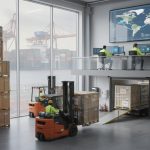In the ever-evolving landscape of the manufacturing industry, Artificial Intelligence (AI) is making a significant impact, particularly in the area of predictive maintenance. This intriguing blend of machinery and cutting-edge technology is revolutionizing the sector. Predictive maintenance, a method that utilizes data-driven algorithms to predict when equipment maintenance should occur, is becoming increasingly reliant on AI, and for several compelling reasons. This article delves into how AI is transforming predictive maintenance in manufacturing, focusing on efficiency, cost reduction, and the enhancement of production quality.
1. Boosting Efficiency with AI-Driven Predictive Maintenance
Efficiency is at the heart of any manufacturing process. The incorporation of AI into predictive maintenance systems is emerging as a game-changer in this aspect. Here, we examine the role AI plays in enhancing the efficiency of manufacturing processes.
Topic to read : What’s the Latest in Autonomous Delivery Systems for Urban Environments?
Predictive maintenance leverages AI and machine learning algorithms to predict potential equipment failures. By accurately identifying when equipment maintenance is due, these AI-driven systems help avoid unplanned downtime, reducing the time spent on unnecessary routine maintenance. The real-time data provided by the system allows for proactive action, ensuring your equipment remains in optimal working condition, thus increasing the overall operational efficiency.
Moreover, AI systems learn and adapt over time, furthering their predictive accuracy. Machine learning algorithms continually analyze data from various sensors embedded in manufacturing machinery. They learn from patterns and correlations, enabling them to predict maintenance needs with increased precision as time goes on. This type of learning-driven maintenance process only becomes more reliable and efficient over time.
Also read : The challenges and limitations of AI image generation
2. Reducing Costs through AI-facilitated Predictive Maintenance
Maintenance costs are a significant concern for the manufacturing industry. AI’s involvement in predictive maintenance is presenting opportunities to manage and reduce these costs. In this section, we explore how AI is aiding in cost reduction in predictive maintenance.
Traditionally, maintenance schedules are based on estimated lifecycles, which often leads to unnecessary maintenance or unexpected equipment failure. However, AI-based predictive maintenance systems provide data-driven insights that help to avoid such situations, reducing the associated costs.
By predicting potential equipment failures, AI can help prevent costly repairs or replacements. The early detection of potential issues allows for minor fixes before they escalate into major problems that demand substantial expenditure. Moreover, reducing unplanned downtime also means less disruption to production, further decreasing the potential loss of revenue.
3. Enhancing Product Quality via AI-Enabled Predictive Maintenance
The quality of products is a key determinant of a manufacturing company’s reputation and market share. AI’s role in predictive maintenance is proving to be instrumental in magnifying the quality of manufacturing outputs. Let’s delve into how AI contributes to quality enhancement in the manufacturing industry.
AI-driven predictive maintenance systems can detect even the slightest inconsistencies or deviations in the production process. Any such irregularities, if left unattended, could compromise the quality of the end product. However, with real-time data analysis and predictive capabilities, these systems alert operators to these issues, enabling immediate rectification.
Furthermore, the machine learning aspect of AI allows these systems to constantly evolve. By learning from past data and recognizing patterns, they can predict and prevent potential quality issues, contributing to the production of consistently high-quality goods.
4. The Potential of AI in Predictive Maintenance
The potential of AI in predictive maintenance in the manufacturing industry is vast and multi-faceted. Here, we will explore some of the exciting possibilities that AI brings to the table in this sphere.
Artificial Intelligence can facilitate the development of a truly smart factory. Such a facility has the potential to autonomously monitor and maintain its own machinery, optimizing efficiency and quality while minimizing costs. This kind of automation could revolutionize the manufacturing industry.
Moreover, with advancements in AI, predictive maintenance could become even more accurate. For instance, AI could potentially predict not just when a machine might fail, but also pinpoint the specific components at risk. This level of detail would allow for even more targeted and effective maintenance.
5. Challenges in Implementing AI in Predictive Maintenance
While the benefits and potential of AI in predictive maintenance are clear, the implementation of this technology is not without its challenges. In this section, we will discuss some of the hurdles that need to be overcome in implementing AI-based predictive maintenance.
One of the primary challenges lies in data collection. AI systems rely heavily on accurate and comprehensive data. Ensuring consistent, high-quality data collection from various machines can be a significant logistical challenge.
Additionally, while machine learning algorithms improve over time, the initial setting up of these systems requires substantial expertise. Understanding the nuances of the algorithms and configuring them correctly to suit specific manufacturing processes can be complex.
Despite these challenges, the potential rewards of implementing AI in predictive maintenance make it a worthwhile endeavor. By boosting efficiency, reducing costs, and enhancing product quality, AI is undeniably changing the landscape of predictive maintenance in the manufacturing industry.
6. The Role of AI in Future-Proofing Maintenance Strategies
In an industry that thrives on innovation and foresight, the role of AI in future-proofing the manufacturing industry cannot be overlooked. This section focuses on how AI and predictive maintenance are shaping the future of manufacturing.
AI-powered predictive maintenance strategies are designed to meet the evolving demands of the manufacturing industry. By leveraging real-time data analysis and machine learning, these strategies are not only capable of avoiding immediate equipment failures but also of predicting future trends. AI’s ability to analyze vast amounts of historical data and provide predictive analytics is a boon for the industry. It empowers decision making, enabling the industry to adapt to changing conditions and stay ahead of the curve.
AI’s role in supply chain optimization also bears mentioning. By providing data-driven insights, AI can streamline the supply chain, improving both efficiency and reliability. This can have a significant impact on the overall productivity of a manufacturing company, indirectly contributing to more effective maintenance strategies.
AI is also proving invaluable in quality control. By identifying and rectifying minor inconsistencies in the production process, AI can prevent significant quality issues in the future. This proactive approach to quality assurance aligns perfectly with the principles of predictive maintenance, underscoring the importance of AI in future-proofing manufacturing processes.
7. Conclusion: The Transformative Impact of AI on Predictive Maintenance
In conclusion, the transformative impact of Artificial Intelligence on predictive maintenance in the manufacturing industry is undeniable. By leveraging real-time data analysis, machine learning algorithms, and predictive analytics, AI is paving the way for more efficient, cost-effective, and high-quality manufacturing processes.
The ability of AI to accurately predict equipment failures, optimize operational efficiency, and reduce maintenance costs is revolutionizing the manufacturing industry. Furthermore, AI’s role in enhancing quality control and future-proofing maintenance strategies reaffirms its invaluable contribution to the industry.
While there are challenges in implementing AI-based predictive maintenance, such as ensuring high-quality data collection and understanding the nuances of learning algorithms, these are outweighed by the potential rewards. It is clear that the integration of AI in predictive maintenance is not merely a trend but a strategic necessity for any forward-thinking manufacturing entity.
By embracing AI, the manufacturing industry stands to gain immensely, benefiting from smarter decision making, increased operational efficiency, and significantly reduced maintenance costs. As we move further into the digital age, the role of AI in predictive maintenance is set to become even more prominent, truly transforming the landscape of the manufacturing industry.










